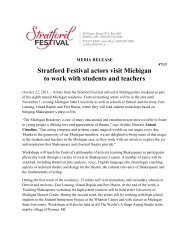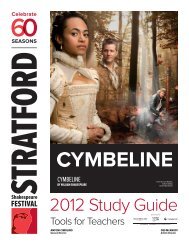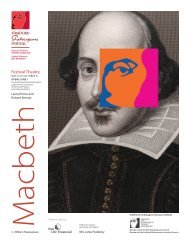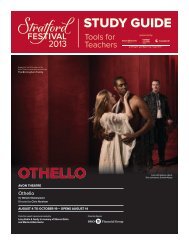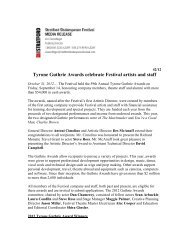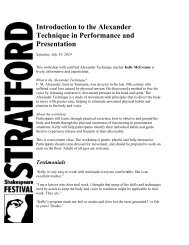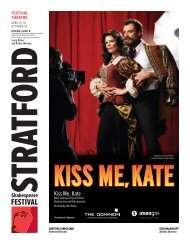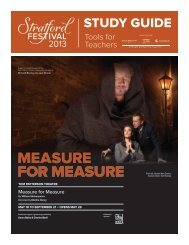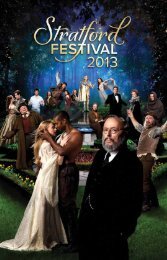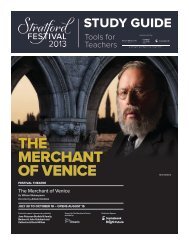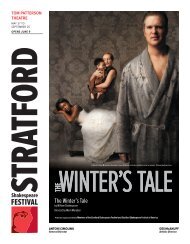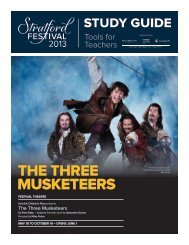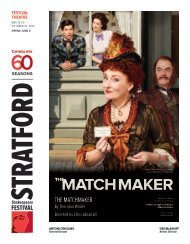RichaRd iii - Stratford Festival
RichaRd iii - Stratford Festival
RichaRd iii - Stratford Festival
You also want an ePaper? Increase the reach of your titles
YUMPU automatically turns print PDFs into web optimized ePapers that Google loves.
The Triumph of Evil<br />
costuMe Designs for richarD by Peter hartwell.<br />
6<br />
Ideas and Insights<br />
ArcelorMittal Dofasco applauds the artists, artisans<br />
and sta� behind every outstanding experience at the<br />
<strong>Stratford</strong> Shakespeare <strong>Festival</strong>.<br />
“And so they said that these matters be<br />
Kings’ games, as it were,<br />
Stage plays, and for the most part played<br />
upon scaffolds.<br />
And they that wise be would meddle no farther.”<br />
– From Sir Thomas More’s<br />
History of King Richard III<br />
More wrote his history in 1513, twenty-eight years<br />
after the death of the historical Richard, and long,<br />
long before Shakespeare took up the story. Two<br />
things struck me about More’s quote: one, that he<br />
had already picked up the theme of theatricality,<br />
and two, that his pun on scaffold was even more<br />
meaningful then than now.<br />
The earliest meaning of scaffold was a platform<br />
where a performance of a mystery or morality play<br />
might occur; its meaning as a place for executions<br />
came later. Richard’s theatrical ancestors, the Vice<br />
characters of those medieval plays, performed their<br />
acts on those very scaffolds as they went about<br />
their stated mission, to destroy virtue wherever they<br />
found it. In order to do so, they would do anything,<br />
assume any role, in order to suborn the natural<br />
order and attempt the triumph of evil.<br />
The great appeal of Vice, the appeal of the<br />
villain, was so strong that this character survived<br />
theatrically long after his pallid cousins Virtue<br />
and Honesty and Plaindealing had faded into<br />
the theatrical mists of time; in fact, his popularity<br />
with audiences assured his survival well into the<br />
Elizabethan era in the guise of such characters<br />
as Richard and Iago and Don John (in Much Ado<br />
About Nothing).<br />
I believe that it is this theatrical heritage that<br />
provides the character of Richard and the play<br />
he shows up in with so much of its appeal. He<br />
is not just a villain; he is The Villain as Actor,<br />
willing to assume any role to achieve his ends.<br />
He is an actor, playing an actor, sharing a secret<br />
with his audience: “I am not what I appear to<br />
be.” My second favourite quote concerning<br />
Richard comes from the Polish critic Jan Kott:<br />
“Richard is not; he just pretends to be.”<br />
In small but significant flashes throughout the<br />
play, Shakespeare appears to be semaphoring<br />
a message to us. It comes and goes amidst the<br />
twists and turns of political manoeuvring, amongst<br />
the emotional turmoil of lies and manipulation,<br />
throughout the emotional wreckage caused by<br />
death and destruction. It is a simple message, but<br />
as Shakespeare sensed, it bears repeating:<br />
“All that is required for the triumph of evil is for<br />
good people to do nothing.”<br />
Miles Potter<br />
Director<br />
costuMe sKetch for richarD by Miles Potter.



